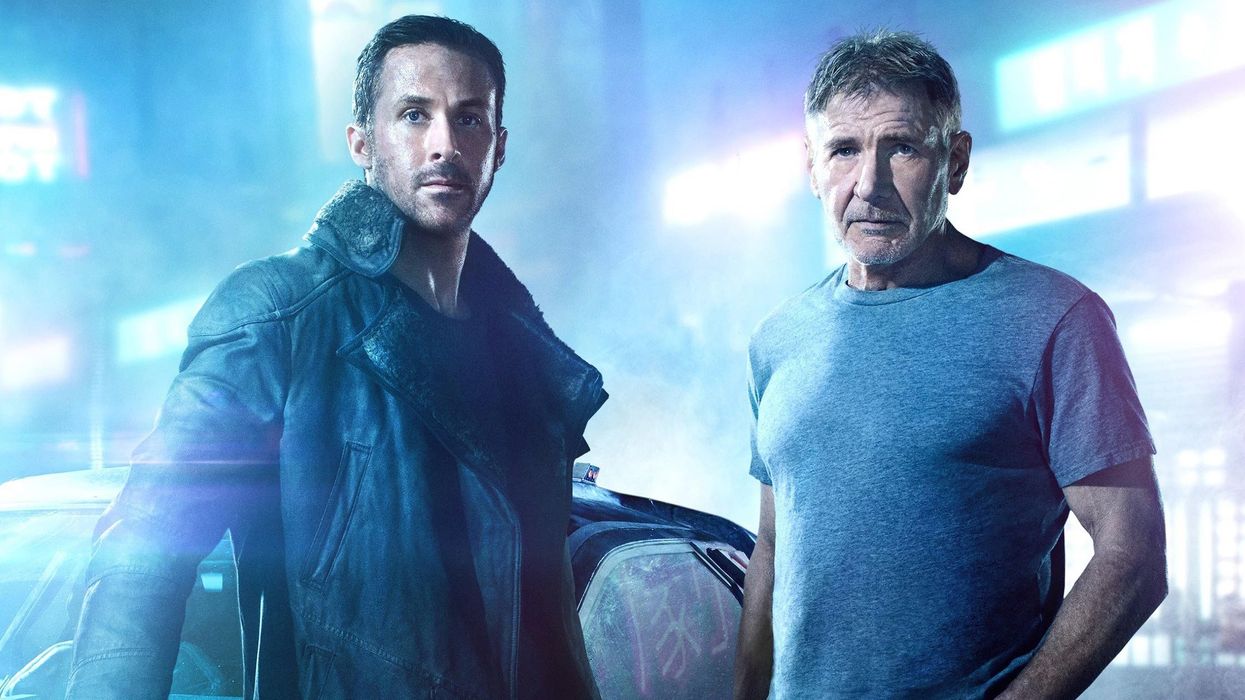Your Definitive Guide to Preparing for 'Blade Runner 2049'
Want to brush up on your 'Blade Runner'? We've got you covered.

We've been waiting for this moment for years. Sure, we put Blade Runner 2049 on our list of most anticipated films for 2017, but our love affair with this sci-fi classic and intrigue about its long overdue sequel goes back much further than that.
After all, Ridley Scott’s 1982 original Blade Runner damn near defined a genre, and the crew behind the new film are top notch. Director Denis Villeneuve was known for suspenseful dramas like Prisoners (2013) and Sicario (2015) until his first foray into sci-fi last year, Arrival, a film that quietly subverted genre conventions. DP Roger Deakins, though not necessarily a household name, is a hero to cinematographers worldwide, and has shot some of the most influential films of the last 30 years, including every Coen Brothers hit fas far back as Barton Fink (1991).
The fact that this team was chosen to helm this ambitious project instead of perhaps more obvious blockbuster choices is a good indicator of the potential quality of the work (That they have Scott’s blessing as EP; the script is co-written by one of the original film’s scribes, Hampton Fancher; and it's scored by master composer Hans Zimmer doesn’t hurt our confidence, either).
Whether you're brand new to the Blade Runner phenomenon and want to know what the hype is all about, or as geekily giddy as we are about this week's release, this canon of related coverage—from background on the film’s stellar helmers to new behind-the-scenes featurettes—will get you up to speed.
Blade Runner 2049: What to Expect
- Watch: 'Blade Runner 2049' Final Prequel Short Reveals the Origin of the Blackout
- Watch: Explore the Epic 'Blade Runner 2049' Set and Props in This BTS Video
- Watch: Dave Bautista Has Something to Hide in New 'Blade Runner 2049' Prequel Short
- Watch: Check Out This 'Blade Runner 2049' Prequel Short from Ridley Scott's Son
- DP Roger Deakins Reveals 'Blade Runner 2049' Tech Challenges in Jaw-Dropping New Featurette
The Original Blade Runner: Looking at its Influence
- Watch: How Ridley Scott Built the Most Effective Sci-Fi World in Cinema History in 'Blade Runner'
- Watch: Why Sounds Make Up the DNA of 'Blade Runner'
- Watch: One Reason Why 'Blade Runner' is the Most Symbolically Complex Movie Ever Made
- Why Does the Ending of 'Blade Runner' Look Familiar? Ask Stanley Kubrick
- Watch: Discover How 'Blade Runner' Created a New Genre
Director Denis Villeneuve: How He Got Here

- How Denis Villeneuve Made the Gridlock Scene in 'Sicario' Unbearably Tense
- How the Color in 'Sicario' Reveals the Battle Between Good & Evil
- 11 Scenes from 'Sicario' Explained in This Cinematography Breakdown
- Watch: Why the Last 30 Seconds of 'Prisoners' is Perfect Storytelling
- The Lay of The Land: How Denis Villeneuve and Ridley Scott Create Mood With Landscape
- This Side-by-Side Comparison of 'Polytechnique' Shows How Timing Can Change a Scene
'Arrival': The Film That Hints at What Could Be

- 'Arrival': How DP Bradford Young Deconstructed Sci-Fi
- How 'Arrival' Screenwriter Eric Heisserer Transformed a Short Story into a Blockbuster Event
- Free Screenplays: 'Arrival' and 'Fences' Among Oscar-Hopeful Screenplays Now Available
- Watch: 'Arrival' Masters the Art of Subtle VFX
- Watch: Why 'Arrival' is a Case Study in Adaptation
- Hot and Cold: Exploring the Cinematography of 'Arrival' DP Bradford Young
DP Roger Deakins: The Man, The Myth, The Legend

- Hang in There, Roger: Why Hasn't One of the Best DPs in the World Won an Oscar Yet?
- Watch: Learn the Power of Silhouettes from the Master Roger Deakins
- Oscar-Nominated Roger Deakins on One of the Best Ways to Learn How to Be a Cinematographer
- Roger Deakins is Over Using Film, But Will Shoot on Any Format, Even a Cell Phone
- Cinematographer Roger Deakins: If the Audience Doesn't Notice, You've Done Your Job
- The Cinematographer's Job Is Not to Create Amazing Images: Roger Deakins on Shooting 'Sicario'
- Roger Deakins on Finding the Essence of a Scene & Why He Only Uses One LUT
- Top 10 Cinematography Tips from Renowned DP Roger Deakins















